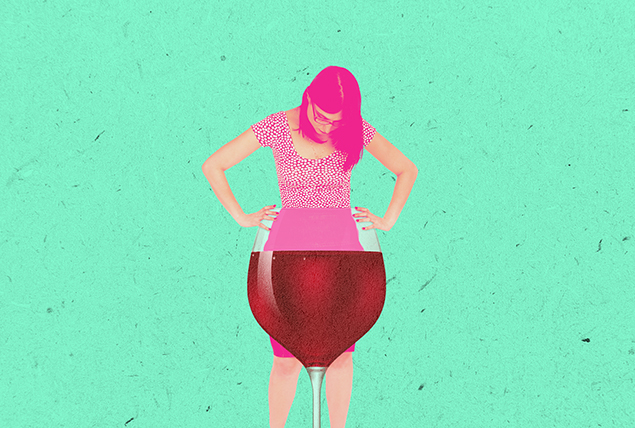Does Wine Make You Bloated? You Aren't Alone

Settling in with a glass or two of wine may seem relaxing, but it can mess with your body (and your menstrual cycle). For women, those problems and the stomach bloating that go with drinking alcoholic beverages may only increase with age.
See how a glass of wine affects women's bodies, why it may make us feel more bloated and how we can get rid of alcohol bloating (or at least reduce bloating).
How does wine affect women differently than men?
You may know that alcohol can affect your fertility. But drinking alcohol such as wine can have other unintended side effects.
Women tend to retain the fluid from wine longer and metabolize alcohol slower than men.
The acidity in white wine really hampers digestion as well as causes acid reflux.
The alcohol in wine affects women differently than men. It raises women's estrogen levels which can lead to bloating, explained Bria Gadd, a certified holistic health coach who specializes in female hormones and is based in Phoenix.
Bloating from wine is caused by the yeast in wine, which can be more intense right before your cycle, as your body produces more yeast when you're ovulating, said Lyn-Genet Recitas, a neuromuscular therapist and sports nutritionist based in New York City.
Does wine become more inflammatory as women age?
As women age and head toward perimenopause and menopause, their bodies start to naturally face a hormone imbalance. This imbalance can lead to a host of potential side effects.
"The higher levels of estrogen along with the uptake in cortisol from the body's response to alcohol suppresses progesterone, further increasing that hormone imbalance, causing common symptoms like digestive issues, sleep disturbances, bloating and weight gain," Gadd said.
Additionally, as women age, muscle is often replaced with fat, which has a higher tendency to retain alcohol. Women tend to metabolize alcohol slower than men as they age, causing the alcohol to stay in the liver longer, according to Naomi Jean-Baptiste, M.D., the Orlando-based founder of Hope4Med, a social network and wellness community for medical professionals.
"In addition to bloating, this increases the risk of more serious issues such as cirrhosis, a condition where the liver is scarred and permanently damaged," she added.
Menopausal women may be experiencing more bloat than they did before.
Are some wines more inflammatory than others?
Wines can be very different, both in terms of the grapes they're made from, the climate and even their soil. And you'd probably be surprised to learn there are more than 10,000 different varieties of grape in the world. So, yes, some wines are more or less inflammatory than others.
If you're experiencing wine bloat, make a note of the type of wine you typically consume when this happens. You may also find that some wines affect your digestive system more than others.
"White wine will mess you up. The acidity really hampers digestion as well as causes acid reflux. Whenever you hamper digestion, you cause bloat. Most of us know, no cold water with a meal; white wine is cold and acidic," Recitas said.
It's not just that cold bright and refreshing glass of Pinot Grigio you're washing down your cacio e pepe with, that celebratory glass of champagne at a wedding can cause irritation, which can lead to bloating, constipation and be harsh on your digestion.
Champagne is the devil in a red dress as it's essentially white wine with extra sugar, extra yeast and carbonation which can lead to bloating, constipation and be harsh on your digestion, Recitas noted.
"If you're finding that wine is leading to bloating, give dry, red wine a try instead of a full-bodied or particularly high-acid white or sparkling wine," said Emily Hardin-Lombardi, a sommelier based in Norwalk, Connecticut. "A great way to avoid the unpleasant side effects of drinking wine or alcohol, in general, would be to try a non-alcoholic wine instead of full-strength."
She mentioned Giesen 0% sauvignon blanc as a personal favorite. It includes the aromas of classic New Zealand sauvignon blanc but cuts out the booze, which can lead to bloating or GI issues.
But red wine, that's healthy?
You might have heard red wine is good for you because of its antioxidants. And it's true that red wine can be less inflammatory than other alcohols.
Red wine contains the antioxidant resveratrol, which has anti-inflammatory properties. And some people have found red wine is less reactive on their bodies compared to other kinds of wine, Jean-Baptiste said.
Not every study agrees. It's possible that resveratrol can help prevent heart damage and low-density lipoprotein (LDL) cholesterol, also known as bad cholesterol. No one is sure, however, that resveratrol can help reduce the risk of heart disease, according to the Mayo Clinic. More research is needed.
Red wine can be anti-inflammatory and decrease cortisol, which helps hormonal balance and digestion. And that's why most people consider red wine to be the "healthiest" option. But red wine can also increase histamine and yeast.
Keep in mind that all wine can increase a histamine response. This response could be heightened by seasonal allergies—especially in the spring and three to five days before your cycle starts.
"It's all about you knowing the possibilities, seeing how your body responds and acting accordingly," Recitas said.
How healthy are organic, natural or sulfite-free wines?
So are natural, organic and sulfite-free wines better for you? Do they cause less inflammation? Not entirely.
"Just because a wine is natural or sulfite-free does not mean you won't be dealing with the nasty side effects of a night of heavy drinking," Hardin-Lombardi said. "Unless you have a diagnosed sulfite allergy, in which case it makes sense to avoid sulfites whenever possible."
All wines contain sulfites to "some degree." That's why you need to research which winemakers add fewer sulfites to their wine, as even tiny amounts of sulfites exist in wine's fermentation, according to Johna Burdeos, R.D., a registered dietitian and freelance health writer in Houston.
All alcohol is inflammatory in nature and causes irritation to the gut microbiome by creating nutrient deficiencies.
"Sulfites are naturally occurring in wine as a byproduct of fermentation, and when they're added, it's usually in a very small amount. A lot of foods we eat every day have much higher sulfite content than wine. Dried fruit, for example, has 10 times the amount of sulfites as commercial wine," Hardin-Lombardi said.
Overconsuming sulfites can lead to headaches, hives, swelling, stomach issues and a worsening of asthma symptoms. Some American wines contain added sulfites to increase their shelf life or added sugar to make the wine taste better, which can lead to migraines and skin and stomach issues.
Wine in Europe tends to have less processing and additives added, which is why when you're traveling there, you might feel you can consume more wine with fewer health-related problems, Recitas explained.
"Some mega-producers have been known to add quite a few chemicals into their wines to increase appearance, flavor and shelf-life. So as a rule of thumb, I try to drink smaller production, lower intervention wines whenever possible, in much the same way as I try to eat organic produce as often as I can," Hardin-Lombardi said.
Are any alcohols less inflammatory?
All alcohol is inflammatory in nature and causes irritation to the gut microbiome by creating nutrient deficiencies, according to Gadd.
"Inflammation from alcohol is influenced by a variety of factors, including the type and amount of alcohol consumed, as well as individual differences in how the body metabolizes alcohol," said Abbas Kanani, M.R.Pharm.S., a superintendent pharmacist with online pharmacy Chemist Click in Hertfordshire, England.
In addition to some red wines, organic tequila can be considered "less inflammatory" because it has less sugar, which is highly inflammatory by nature, Gadd pointed out.
"Tequila is made from the agave plant and contains compounds called agavins which have also been shown to have anti-inflammatory effects," Kanani said.
In addition to red wine and tequila, both gin and or vodka may cause less inflammation. Gin's juniper berries contain antioxidants and vodka tends to have fewer impurities compared to other types of alcohol because it's distilled from grains or potatoes.
"Excessive consumption of any type of alcohol can still have negative effects on the body and should be consumed in moderation," Kanani said.
Even though gin, vodka and tequila can be less inflammatory, you should still avoid mixing them with sugary beverages, which is linked to inflammation, Burdeos added.
How long does wine bloat last?
When you're planning on having a few drinks with friends, you should know that you may be dealing with the side effects of alcohol intake for anywhere from a few hours to a few days, according to Cleveland Clinic.
Drink water, avoid carbonated drinks, eat enough fiber and get enough physical activity to help reduce your bloat. If you notice an increase in bloat, it could be a sign of a different health condition that may necessitate a visit to your healthcare provider.
As a general rule, always pay attention to what you are eating and drinking.
If your symptoms don't improve or become worse, speak with your doctor for peace of mind.
"All alcohol causes inflammation," Burdeos said. "To minimize this, you should either avoid alcohol completely or limit your drinking to no more than one drink per day for women and two for men."


















